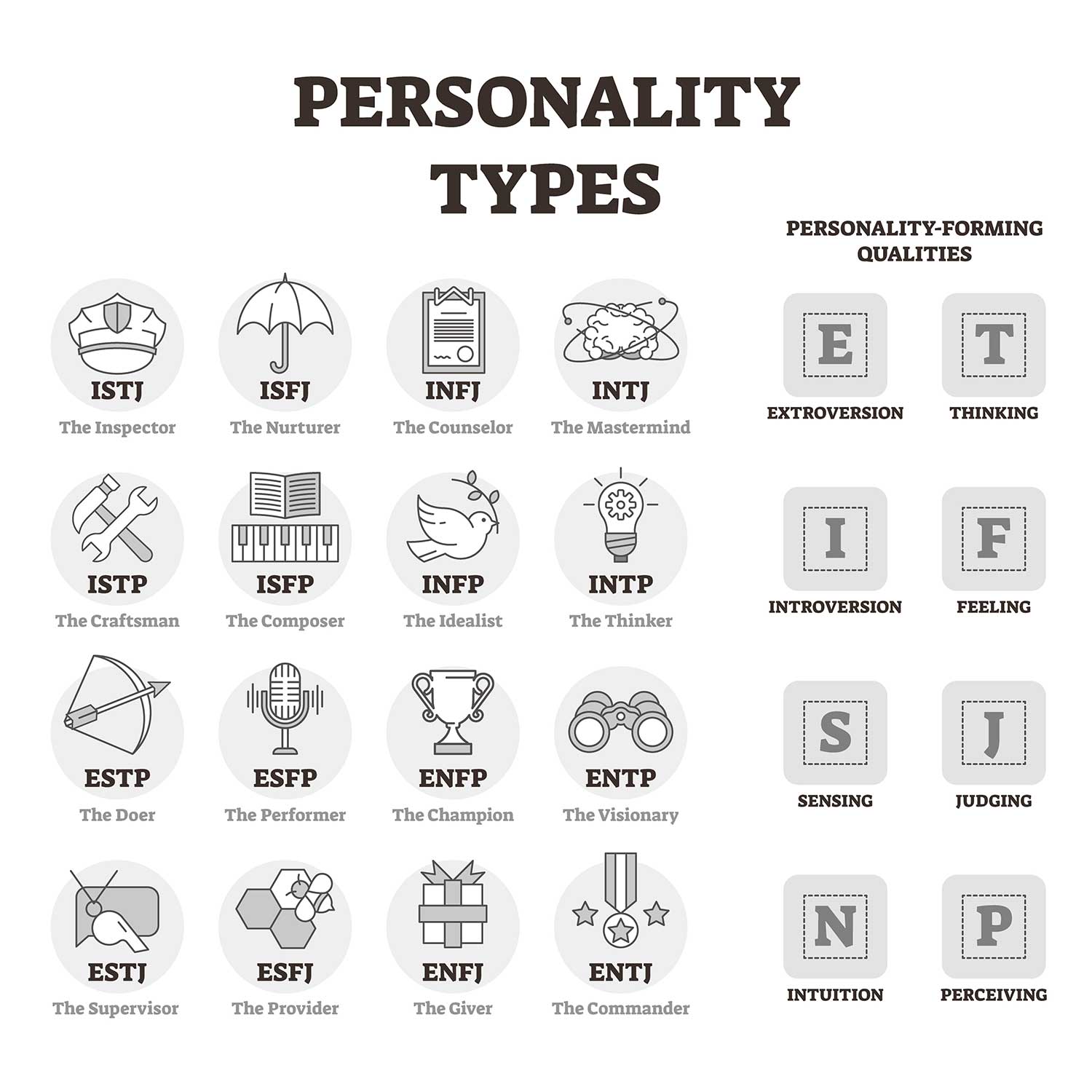The Myers-Briggs Type Indicator (MBTI) is an introspective, self-report evaluation that identifies a person’s personality type and psychological preferences.
The MBTI propose that four different cognitive functions determine one’s personality: extraversion vs. introversion, sensing vs. intuition, thinking vs. feeling, and judging vs. perceiving.
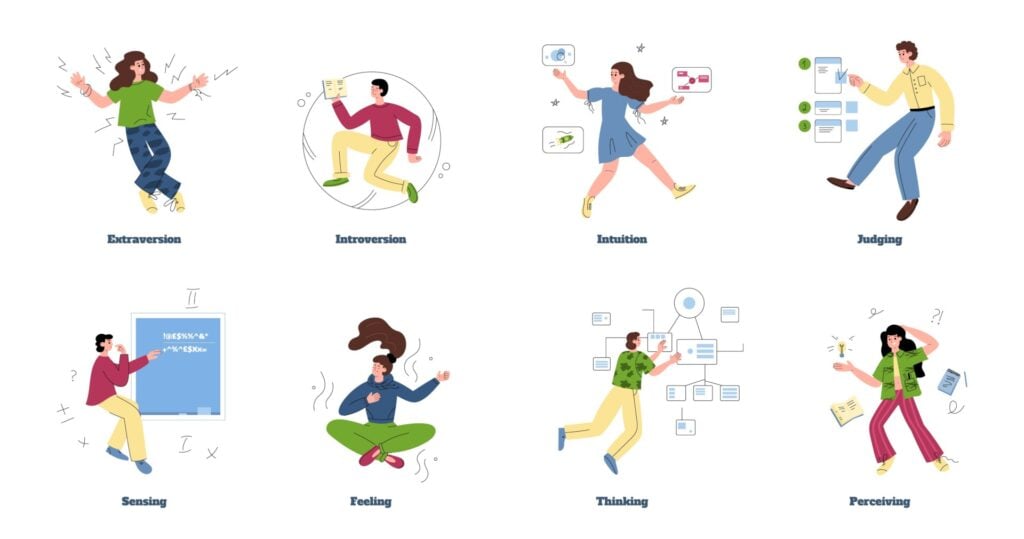
MBTI Meaning
MBTI, short for Myers-Briggs Type Indicator, is a widely used personality assessment tool based on Carl Jung’s theories.
It categorizes individuals into one of 16 personality types, providing insights into their preferences in four dimensions: extraversion/introversion, sensing/intuition, thinking/feeling, and judging/perceiving. MBTI is commonly used for personal development, career counseling, and team building.
According to the MBTI theory, you combine your preferences to determine your personality type. The 16 types are referred to by an abbreviation of the initial letters of each of the four type preferences of each cognitive function.
For example, “ISTP” would denote introversion, sensing, thinking, and perceiving. No combination is considered “better” or “worse” than another– all types are considered equal.
The MBTI emphasizes that each individual has specific preferences in the way they view the world, and this assessment provides insight into the differences and similarities in people’s experiences of life.
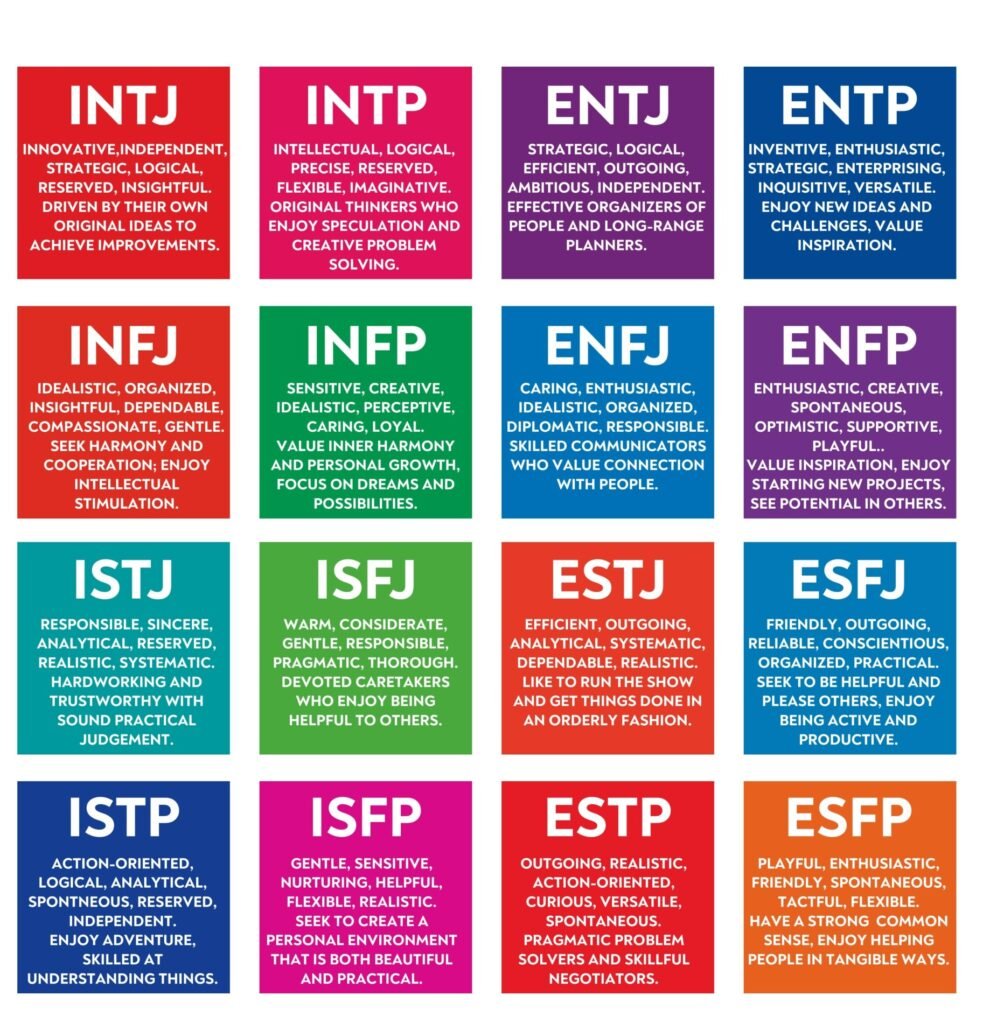
The Development of the Myers-Briggs Test
The MBTI tool was developed by Isabel Briggs Myers and her mother Katharine Cook Briggs in 1942 and is based on psychological conceptual theories proposed by Swiss psychiatrist Carl Jung in his work, Psychological Types.
Jung’s theory of psychological types was based on the existence of four essential psychological functions – judging functions (thinking and feeling) and perceiving functions (sensation and intuition ).
He believed that one combination of the functions is dominant for a person most of the time.
Jung’s theory holds that human beings are either introverts or extroverts, so the combinations are expressed in either an introverted or extroverted form (This is why E or I is the first letter of the series). The remaining three functions operate in the opposite orientation.
The Four Dichotomies:
The purpose of this assessment is to assign individuals into one of four categories based on how they perceive the world and make decisions, enabling respondents to further explore and understand their own personalities.
The four categories are: introversion or extraversion, sensing or intuition, thinking or feeling, and judging or perceiving. Each person is said to have one preferred quality from each category, producing 16 unique personality types.
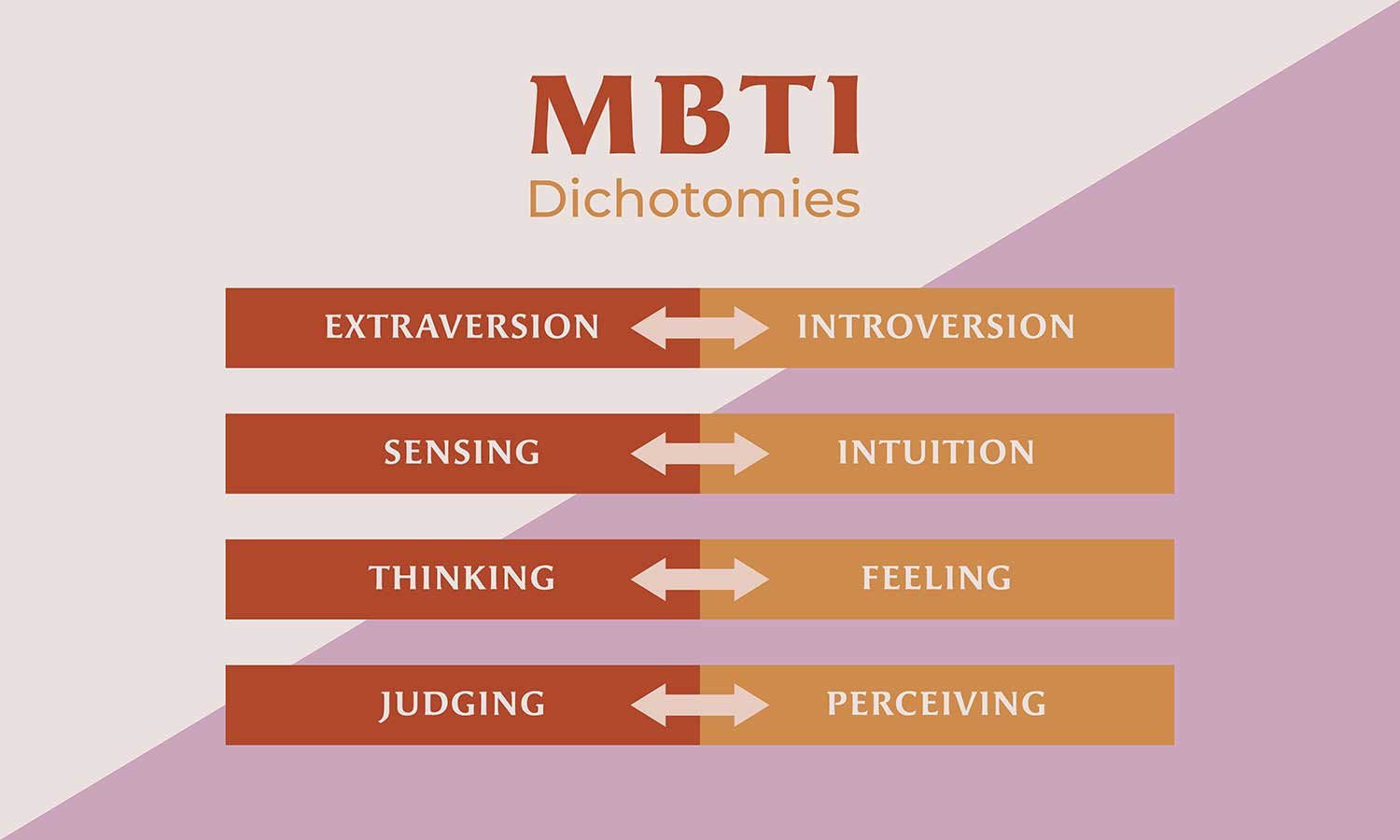
Extraversion (E) vs. Introversion (I)
- These are opposite ways to direct and receive energy. Do you prefer to focus on the outer world or your inner world?
- This dichotomy describes how people respond and interact with others and orient themselves within the world around them.
-
Extraverts tend to be action-oriented – focusing on other people and things, feeling energized by the presence of others, and emitting energy outwards.
-
Introverts are more thought-oriented. They enjoy deep and meaningful social interactions and feel recharged after spending time alone.
Sensing (S) vs. Intuition (N)
- Do you prefer to focus on the basic information you take in, or do you prefer to interpret and add meaning?
- This dichotomy describes how people gather and perceive information.
- Sensing-dominant people tend to prefer to focus on facts and details and perceive the world around them through their five senses.
- Intuition-dominant types are more abstract in their thinking, focusing on patterns, impressions, and future possibilities.
Thinking (T) vs. Feeling (F)
- When making decisions, do you prefer to first look at logic and consistency or first look at the people and special circumstances?
-
This dichotomy describes how people make decisions and use judgments.
-
Thinking types use logic and facts to judge the world, while feeling types tend to consider emotions.
Sensing (S) vs. Intuition (N)
- Do you prefer to focus on the basic information you take in, or do you prefer to interpret and add meaning?
-
This dichotomy describes how people gather and perceive information.
-
Sensing-dominant people prefer to focus on facts and details and perceive the world through their five senses.
-
Intuition-dominant types are more abstract in their thinking, focusing on patterns, impressions, and future possibilities.
Judging (J) vs. Perceiving (P)
- In dealing with the outside world, do you prefer to get things decided, or do you prefer to stay open to new information and options?
-
This dichotomy describes how people tend to operate in the outside world and reveals the specific attitudes of the functions.
-
Those judging dominant tend to be more methodical and results-oriented and prefer structure and decision-making.
-
Perceiving dominant individuals are more adaptable and flexible and tend to be good at multitasking.
The dominant function is the primary aspect of personality, while the auxiliary and tertiary functions play supportive roles.
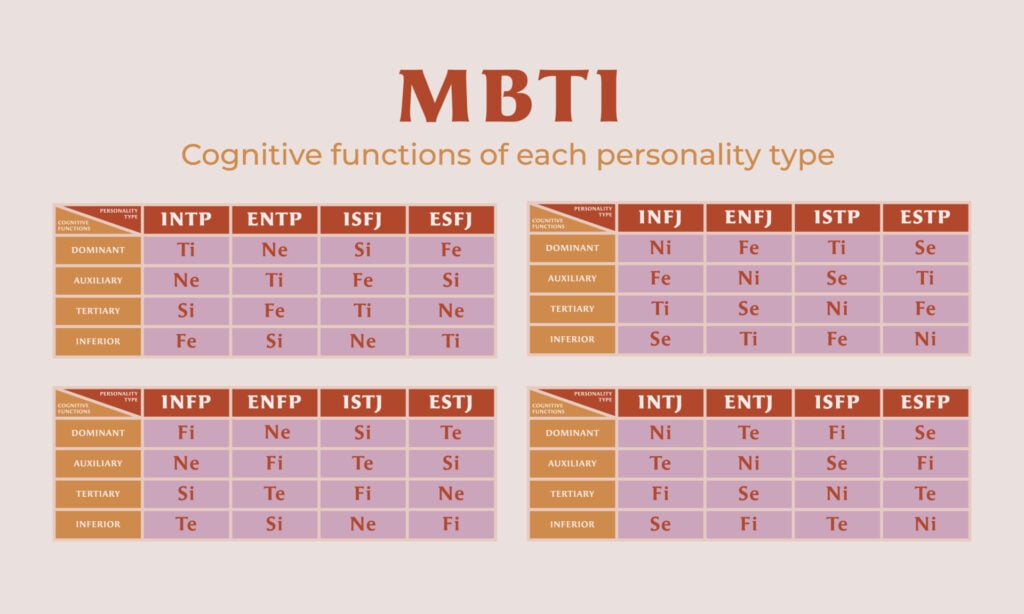
The 16 Personality Types
ISTJ – The Logistician
These individuals tend to be serious, matter-of-fact, and reserved. They appreciate order and organization and pay a great deal of attention to detail.
They like to plan things out in advance and place an emphasis on tradition and law. They are responsible and realistic and can be described as dependable and trustworthy.
ISFJ – The Defender
These individuals are friendly, responsible, and reserved. They are service and work-oriented, committing to meeting their obligations and duties.
They are loyal, considerate, and place a lot of focus on the care of others. They are non-confrontational and value an orderly and harmonious environment.
INFJ – The Advocate
People with this personality type are serious, logical and hardworking. They are also compassionate, conscientious, and reserved.
They value close, deep connections and are sensitive to the needs of others, but also need time and space alone to recharge.
INTJ The Architect
These people are highly independent, self-confident and prefer to work alone. They are analytical, creative, logical, and driven.
They place an emphasis on logic and fact rather than emotion and can be viewed as perfectionist.
They tend to have high expectations of competence and performance for themselves and others.
ISTP – The Crafter
People with this personality type are fearless and independent. They love adventure, new experiences, and risk-taking.
They tend to be quiet observers and are not well attuned to the emotional states of others, sometimes coming across as insensitive or stoic.
They are results- oriented, acting quickly to find workable solutions and understand the underlying cause of practical problems.
ISFP – The Artist
These individuals are quiet, friendly, easy going, and sensitive. They have a strong need for personal space and time alone to recharge.
They value deep connection and prefer to spend time with smaller groups of close friends and family.
They are highly considerate and accepting, avoiding confrontation and committed to their values and to people who are important to them.
INFP – The Mediator
These people are creative, idealistic, caring, and loyal. They have high values and morals, and are constantly seeking out ways to understand people and to best serve humanity.
They are family and home-oriented and prefer to interact with a select group of close friends.
INTP – The Thinker
People with this personality type are described as quiet, contained, and analytical. They are highly focused on how things work and on solving problems, and tend to be good at logic and math.
They are more interested in ideas and theoretical concepts than in social interaction. They are loyal and affectionate to their closest friends and family, but tend to be difficult to get to know.
ESTP – The Entrepreneur
These individuals are action-oriented, taking pragmatic approaches to obtain results and solve problems quickly. They are often sophisticated, charming, and spontaneous.
They are outgoing and energetic, and enjoy spending time with a wide circle of friends and acquaintances. They focus on the here and now and prefer the practical over the abstract.
ESFP – The Entertainer
These people tend to be outgoing, friendly, and impulsive, seizing energy from other people. They love to be the center of attention and enjoy working with others in new environments.
They can be described as easy going, fun, and optimistic. They are spontaneous and focused on the present moment, and enjoy learning through hands-on experiences with other people.
ENFP – The Champion
These individuals are enthusiastic, creative, energetic, and highly imaginative. They have excellent people and communication skills and are good at giving others appreciation and support.
They do, however, seek approval from others. They value emotions and expression. They dislike routine and might struggle with disorganization and procrastination.
ENTP – The Debater
People with this personality type can be described as innovative, outspoken, and lively. They are idea-oriented and are more focused on the future rather than on the present moment.
They enjoy interacting with a wide variety of people and love to engage with others in debates. They tend to be easy to get along with, but also can be argumentative at times. They are great conversationalists and make good entrepreneurs.
ESTJ – The Director
These people are responsible, practical, and organized. They are assertive and like to take charge, focused on getting results in the most efficient way possible. They have clear standards and place a high value on tradition and rules.
They can be seen as rigid, stubborn, or bossy as they are forceful in implementing their plans. However, they tend to excel at putting plans into action because they are hardworking, self confident, and dependable.
ESFJ – The Caregiver
These individuals are warmhearted, conscientious, and harmonious. They wear their hearts on their sleeves and tend to see the best in others.
They enjoy helping others and providing the care that people need, but want to be appreciated and noticed for their contributions. They are careful observers of others and excel in situations involving personal contact and community.
ENFJ – Protagonist
These people are responsible, warm, and loyal. They are highly attuned to the emotions of others and capable of forging friendships with essentially anybody.
They have a desire to help others fulfill their potential, and they derive personal satisfaction from helping others. They tend to make good leaders as they are highly capable of facilitating agreement among diverse groups of people.
ENTJ – The Commander
These individuals like to take charge. They value organization and structure and appreciate long-term planning and goal setting.
They have strong people skills and enjoy interacting with others, but they are not necessarily attuned to their own emotions or the emotions of others.
They have strong leadership skills and tend to make good executives, captains, and administrators.
Benefits of MBTI:
- Companies can learn how to better support employees, assess management skills, and facilitate teamwork
- Coaches can utilize the information to help understand their preferred coaching approach
- Teachers can assess student learning style
- Teens and young adults can better understand their learning, communication, and social interaction styles
- Teens can determine what occupational field they might be best suited for
- Individuals can gain insight into their behavior
- Partners can better understand themselves and their spouses, allowing for more cohesive teamwork and greater productivity
Criticisms of MBTI:
The MBTI has been criticized as a pseudoscience and does not tend to be widely endorsed by psychologists or other researchers in the field. Some of these critiques include:
- There is little scientific evidence for the dichotomies as psychometric assessment research fails to support the concept of a type, but rather shows that most people lie near the middle of a continuous curve.
- The scales show relatively weak validity as the psychological types created by Carl Jung were not based on any controlled studies and many of the studies that endorse MBTI are methodologically weak or unscientific.
- There is a high likelihood of bias as individuals might be motivated to fake their responses to attain a socially desirable personality type.
- Test-retest reliability is low (ie: test takers who retake the test often test as a different type)
- The terminology of the MBTI is incomprehensive and vague, allowing any kind of behavior to fit any personality type.
Take the MBTI (Paper Version)
Sources
Myers, I. B. (1962). The Myers-Briggs Type Indicator: Manual (1962).
Myers, Isabel B.; Myers, Peter B. (1995) [1980]. Gifts Differing: Understanding Personality Type. Mountain View, CA: Davies-Black Publishing. ISBN 978-0-89106-074-1.
Pittenger, D. J. (2005). Cautionary Comments Regarding the Myers-Briggs Type Indicator. Consulting Psychology Journal: Practice and Research, 57(3), 210-221.
The purpose of the Myers-Briggs Type Indicator®. The Myers & Briggs Foundation: MBTI Basics. (n.d.). Retrieved from https://www.myersbriggs.org/my-mbti-personality-type/mbti-basics/

